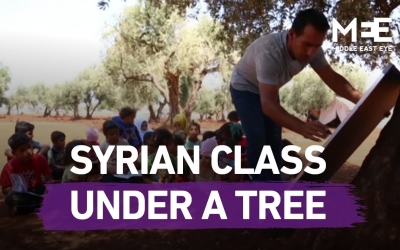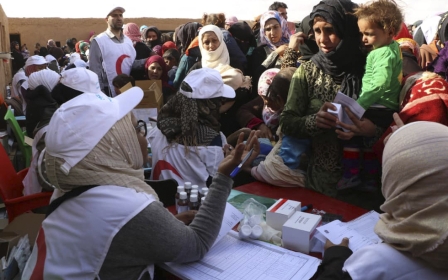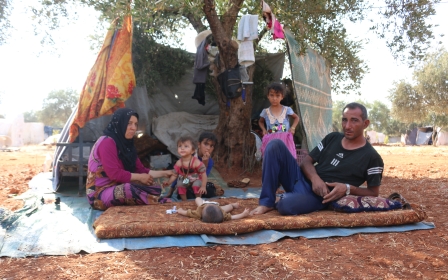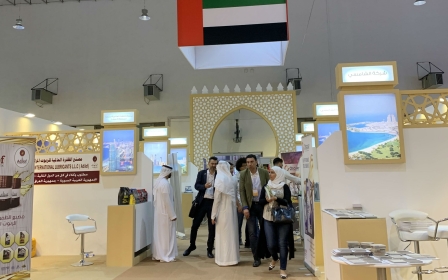Food aid reaches Syria's Rukban camp for first time in seven months
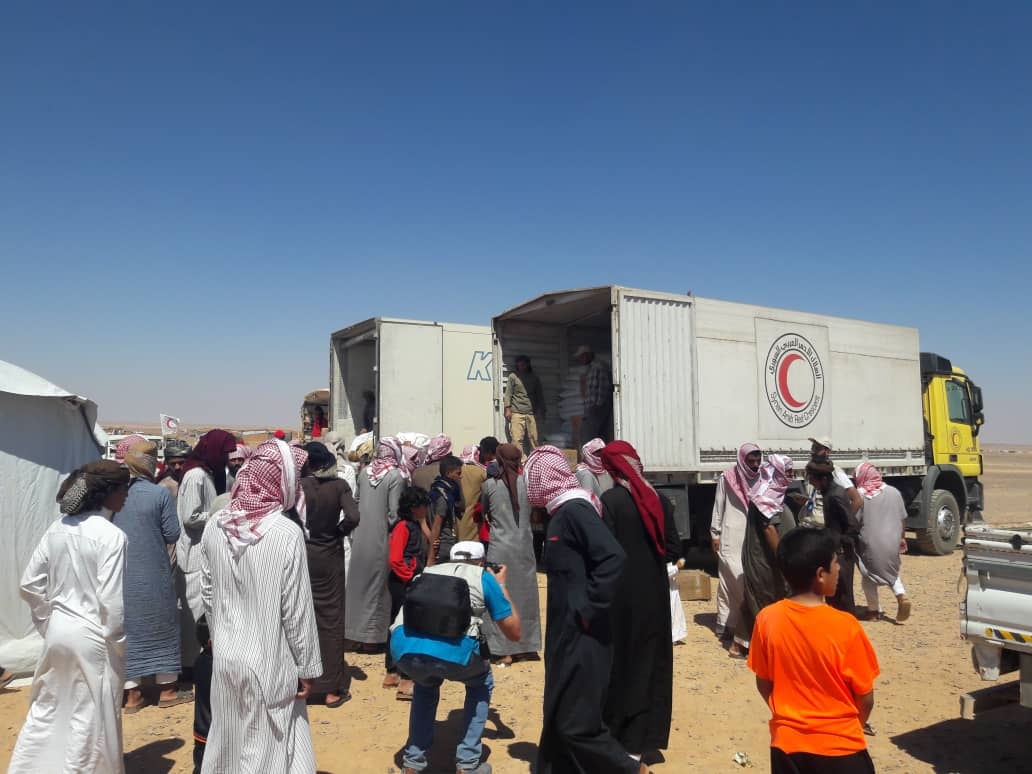
For the first time in seven months, thousands of displaced Syrians in a desolate camp on the Syrian-Jordanian border are receiving organised supplies of food aid.
Dozens of trucks belonging to the United Nations and the Syrian Arab Red Crescent (SARC), a government-affiliated aid agency, entered Rukban camp on Friday morning, a UN spokesperson and camp residents told Middle East Eye.
Long-starved families lined up to receive packages of flour, rice and other food items, according to residents and an apparent UN document detailing the distribution plan seen by MEE.
It was the first time they had received desperately needed donations of basic food and other supplies since a previous UN-SARC aid convoy brought food and medicine in early February.
The aid distribution was "scheduled to start in Rukban" on Friday, said Hedinn Halldorsson, a spokesperson for the UN's aid coordination body OCHA in Damascus.
New MEE newsletter: Jerusalem Dispatch
Sign up to get the latest insights and analysis on Israel-Palestine, alongside Turkey Unpacked and other MEE newsletters
He could not provide further details on the day's distribution efforts, citing "security and operational" concerns. A SARC spokesperson did not comment by the time of publication.
"I'm speaking to you right now from one of the distribution points," said Omar al-Homsi, a journalist living in Rukban. In a photo he sent, dozens of men and boys are seen gathered around trucks with SARC logos, where workers appear to be unloading packages.
According to the as-yet unverified UN distribution plan, each family would receive 50kg of flour, 15kg of rice, as well as other basic food supplies.
A makeshift medical clinic in Rukban was also promised women's medical supplies, the clinic's nurse, Shukri Shihab, said. MEE could not independently confirm his claim.
The aid distribution is set to last five days and is organised by residents' tribes and town of origin, according to the document.
Friday's delivery is the second part of a controversial joint UN-SARC mission to Rukban that is later set to see the United Nations help transport camp residents who wish to leave for government-controlled Homs.
The first visit came last month when UN and SARC personnel registered camp residents who wanted to go to Homs and those who chose to remain in Rukban despite deteriorating humanitarian conditions.
'We're just living on the absolute basics. Rice, bulgur. Fresh vegetables are something extra now'
- Omar al-Homsi, journalist
But the plan has faced sharp criticism within Rukban, where residents have said they feel pressure to return to Homs amid a months-long "siege" on the camp since last year when pro-government forces reportedly blocked vital desert smuggling routes.
The routes once supplied Rukban with flour, vegetables, medicine and other supplies brought in from government-controlled territory in Syria that helped camp residents survive in the remote desert encampment.
A small number of smugglers still make it into Rukban, but only every two or three weeks, said Shihab. Whatever supplies do make it into Rukban, he said, are at a "very high price".
"For one kilo of tomatoes, it's 1,000 Syrian lira [$2]." Cucumbers, another staple, are the same. "If an average family of five people needs vegetables to eat, they must pay around $5. And that's just for one day's meals," Shihab said. His clinic is also facing a "huge shortage" of medicine, he added.
"We're just living on the absolute basics," said Homsi, the journalist. "Rice, bulgur. Fresh vegetables are something extra now."
A way out of the desert
Somewhere between 12,700 and 25,000 Syrians still remain in Rukban, according to the latest available UN numbers. Most of them fled heavily tribal towns in eastern Syria following battles and Islamic State group (IS) invasions in 2015.
But in Rukban they found little respite. Now a sprawl of mud houses, the camp sits within a no-man's-land between two earthen berms demarcating the Syrian and Jordanian borders.
The surrounding 55km of desert are nominally controlled by a US-backed rebel faction Mughawir a-Thowra, which operates out of the nearby al-Tanf military garrison.
Outside of that 55km zone is a vast expanse of eastern Syrian desert controlled by Damascus and dotted with pro-government militias.
The area was never meant to sustain a permanent settlement. Before the war, Rukban had no residents. There were no public services, hospitals or schools. Syrians fleeing there had intended to stay only temporarily before later crossing into Jordan.
But an IS-claimed car bomb in 2016 prompted Amman to shut off the border area completely, declaring its side of the surrounding desert a closed military zone.
Organised aid deliveries have been scarce. The last aid convoy to enter the camp was in early February via Damascus, at the tail end of an especially brutal winter in Rukban. At least 12 children died early this year from the bitter cold, according to UN children's agency Unicef. Five of them were newborns.
Nearly 18,000 people have left the increasingly destitute camp since March, the UN estimates, after Russian forces opened up a "humanitarian corridor" from Rukban to government-controlled Homs.
For returnees, the trip back to Homs means an escape from deteriorating conditions despite reports of arrest and mistreatment back in government territory.
"There's a huge shortage of food in the camp," said one resident in Rukban, who requested anonymity for safety reasons. He expressed doubt that the current aid delivery's supplies would last long.
'We're being forced to just survive'
- Mohammed, Rukban resident
Another camp resident, Mohammed, a father of nine, complained about the lack of available insulin for his diabetes. His family now relies on dried foods including rice and lentils, he said.
"We're being forced to just survive."
Nevertheless, some 47 percent of residents surveyed in last month's UN-SARC mission said they preferred to stay in the camp, the UN's Syria humanitarian chief Panos Moumtzis told the AFP news agency in an interview last week. They cited "security concerns" and "fear of detention," he said.
Among them is Shihab, who was arrested by the government in 2012 for providing medical treatment to wounded protesters.
He fears arrest yet again if he were to return to Homs on the UN's upcoming convoy, or via the Russian "humanitarian corridor".
"I know what this regime can do," he said.
Middle East Eye delivers independent and unrivalled coverage and analysis of the Middle East, North Africa and beyond. To learn more about republishing this content and the associated fees, please fill out this form. More about MEE can be found here.



